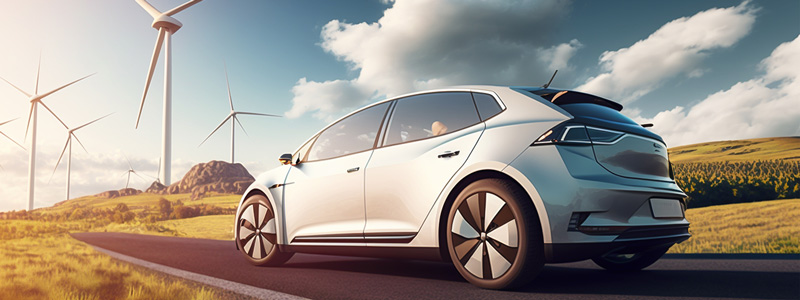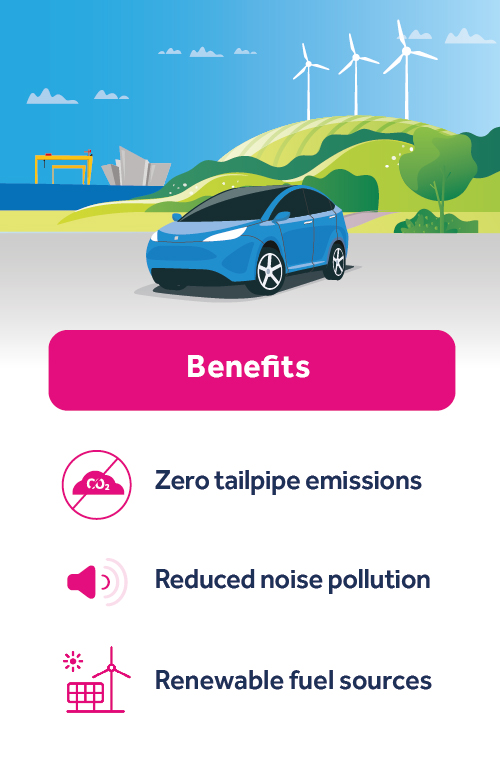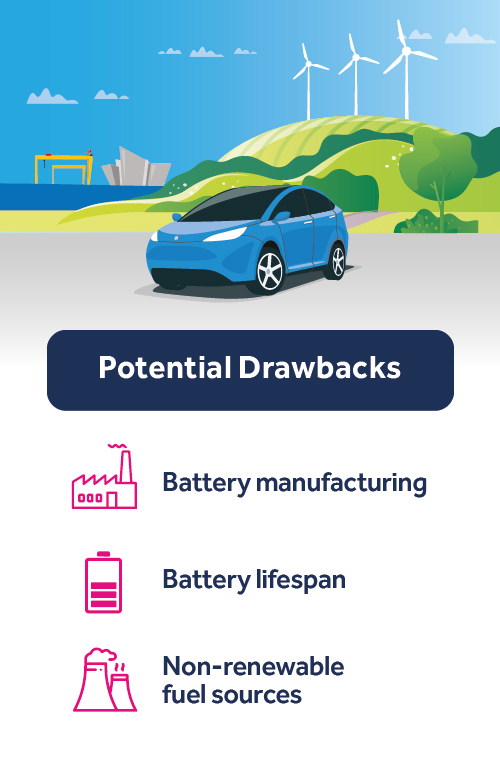Are you thinking about buying an electric car and wondering just how environmentally friendly they are?
We will look at the key benefits and downsides of swapping a petrol or diesel vehicle for an electric one. We will explain, how electric cars can be better for our planet.
Article Contents:
- The era of the electric car
- Benefits of electric cars on the environment
- Zero exhaust emissions
- Reduced noise pollution
- Renewable fuel sources
- Drawbacks of electric cars on the environment
- Battery manufacture
- Battery lifespan
- Non-renewable fuel sources
- Hybrid cars and the environment
- Are electric cars really better for the environment?
- Power NI electric vehicle tariff
The era of the electric car

There are now more than a quarter of a million electric vehicles (EVs) on the roads in the UK and Northern Ireland. The growing popularity of EVs is a trend that is being replicated in other countries.
Just under 39,000 electric vehicles and plug-in hybrid vehicles were sold in the UK in 2016. By 2027, this figure is expected to reach 637,000 per year. With a 77% rise in sales of plug-in vehicles from 2020 to 2021 alone, we’re witnessing the start of the era of the electric car.
As prices relative to combustion engine vehicles drop and more charging points are installed, more of us are making the switch to electric cars. The ban on the sale of new petrol vehicles from 2030 and the UK government’s commitment to achieving net zero emissions by 2050 are also encouraging the growth of the EV market.
Climate change is the driving force behind the widespread move to electric vehicles. So when you’re making the decision to switch, it’s important to understand the impact of electric cars on the environment and their role in creating a greener future.
Benefits of electric cars on the environment

The increasing popularity of electric cars is driven by the benefits they have on the environment. Let’s take a closer look at what those benefits are.
Zero exhaust emissions
The key benefit of electric cars is that — unlike petrol and diesel cars — they don’t release any greenhouse gases or air pollutants.
Conventional cars release carbon dioxide, which is responsible for more than 60% of the greenhouse effect and causes climate change. They also emit nitrogen oxides, which create smog and can cause respiratory problems. Almost a quarter of all carbon dioxide emissions globally are created by transport, while 32% of all nitrogen oxide emissions in the UK come from road transport.
Electric vehicles don't rely on fossil fuels for power, which means they don't release any carbon dioxide or other harmful gases from their exhausts. This improves air quality and reduces air pollution. As well as helping to tackle climate change, this also benefits our respiratory health — particularly for those of us who live in towns and cities — by reducing the number of harmful PM10 and PM2.5 particles in the air.
Reduced noise pollution
Electric vehicles are much quieter than petrol and diesel cars.
With no internal combustion engine and far fewer moving parts, EVs are up to 5 decibels quieter than conventional cars when travelling at low speeds. If you think of a busy road full of petrol and diesel cars crawling through a town or city centre, all those saved decibels start to add up.
The European Environment Agency found that more than 100 million people in Europe are affected by noise pollution, which is defined as harmful or annoying levels of noise. It identified road traffic as the main cause of this problem.
In the UK, 90% of the population can hear traffic noise from their home and 10% of them find it annoying. Noise pollution has been linked to stress, sleep disturbance, poor mental health, and cardiovascular problems. Moving to electric vehicles dramatically reduces noise pollution and alleviates the problems it causes in our communities.
Renewable fuel sources
Electric vehicles can be powered solely by energy from renewable sources, such as solar, wind and hydropower. This use of green energy is in contrast to the non-renewable fossil fuels — or brown energy — that are used in combustion engine cars.
Petrol, diesel and LPG are all fossil fuels, which release harmful gases when burnt and which cannot be replaced once used.
When electric vehicles run off green energy, there is the dual benefit of there being no emissions from the exhaust of the vehicle and no fossil fuels being used to power the vehicle even indirectly. The result is less air pollution, savings of limited resources, and a reduced carbon footprint.
Potential drawbacks of electric cars on the environment

While there are many benefits of electric cars, they are by no means a perfect solution to our climate crisis. Here are some of the downsides to electric vehicles.
Battery manufacturing
While electric cars don’t need fossil fuels to run, they do need lithium batteries. Lithium and other rare metals used to make electric car batteries are finite resources in the same way that fossil fuels are. Also, lithium mines have been linked with water contamination, air contamination and intensive use of water that damages agriculture and the ecosystem in the area around mines.
Emissions created during battery manufacturing and other aspects of electric vehicle manufacturing are usually greater than emissions from making a conventional car — 59% greater according to one study.
The balance will then tip in favour of the electric car over both vehicles’ lifetimes. This Carbon Wheels calculator will help you to see how that balance changes over time.
Although electric cars ultimately have the edge, the environmental impact of battery production is a major concern. That’s why research is ongoing into whether batteries made using materials like salt or magnesium could eventually replace lithium. Research is also being undertaken into more effective ways to reuse and recycle lithium batteries.
Battery lifespan
The lifespan of the batteries in electric vehicles is another potential drawback.
Currently, an electric vehicle battery is expected to last for around 150,000 miles before it starts to lose capacity. This figure will be lower if the vehicle has been reliant on rapid charging. When the battery needs to be replaced, it is likely to cost more than the car cost in the first place. While a conventional car battery might only last for 50,000 miles, the cost of replacing it is much lower.
At the point that an electric vehicle battery needs to be replaced, you will be encountering the environmental problems of battery manufacturing that we mentioned above all over again. Ultimately, future research into recycling lithium batteries might extend electric vehicle battery lifespan and create a sustainable solution to this problem.
Non-renewable fuel sources
While the fact that electric cars can be powered by renewable energy sources is a key benefit, the downside is that there are no guarantees that they will be powered by renewable energy sources.
If the power used to charge an electric car has come from coal, gas or oil-fired power stations, then the vehicle is indirectly being powered using fossil fuels. Although this isn’t ideal, it still results in far fewer emissions than would be produced by a petrol or diesel car.
In the UK, emissions from electric cars are around 30% lower than petrol cars on average based on how electricity is generated. That figure rises to around 70% in countries with fewer coal and gas-fired power plants, such as Sweden and France, and will continue to increase as the proportion of renewable energy rises.
Here at Power NI, we overcome this potential drawback by offering electric car tariffs for which we source the amount of power you use from 100% renewable sources.
Are hybrid cars better for the environment?

The impact of hybrid cars on the environment depends on the type of car and how it’s being driven.
If you're driving a hybrid car using mostly electric power, it will be better for the environment than a conventional car. But when you drive your hybrid car using the combustion engine it creates exactly the same emissions as a non-hybrid petrol or diesel car. In this case, there is no difference between a hybrid car and an internal combustion engine car.
Key considerations when weighing up the difference between electric cars and hybrid cars include:
- Hybrid cars still have internal combustion engines that rely on fossil fuels and release harmful gases
- How green a hybrid car is will depend on how much of its journey uses electric miles
- Self-charging hybrid cars don’t run for as many electric miles as plug-in hybrids or fully electric cars
Are electric vehicles really better for the environment?
There is no doubt that electric vehicles are better for the environment than conventional vehicles. They are not perfect and there is definitely still room for improvement, but the environmental benefits are clear. Every electric car on our roads saves an average of 1.5 million grams of carbon dioxide that would otherwise be polluting our atmosphere each year.
These carbon savings are made because electric vehicles don’t release any exhaust emissions and can run entirely on renewable energy. As battery manufacturing and recycling processes improve, and as renewable energy sources play an even greater role in our energy supply, the environmental benefits of electric cars will only increase further. We’re taking steps to accelerate those benefits.
Power NI electric vehicle tariff
We’re committed to helping you to maximise the environmental benefits of switching to an electric car. That’s why we’ve created plans that source the amount of power you use from 100% renewable generators, offer cheaper electricity for overnight charging, and give you all the flexibility you need.
